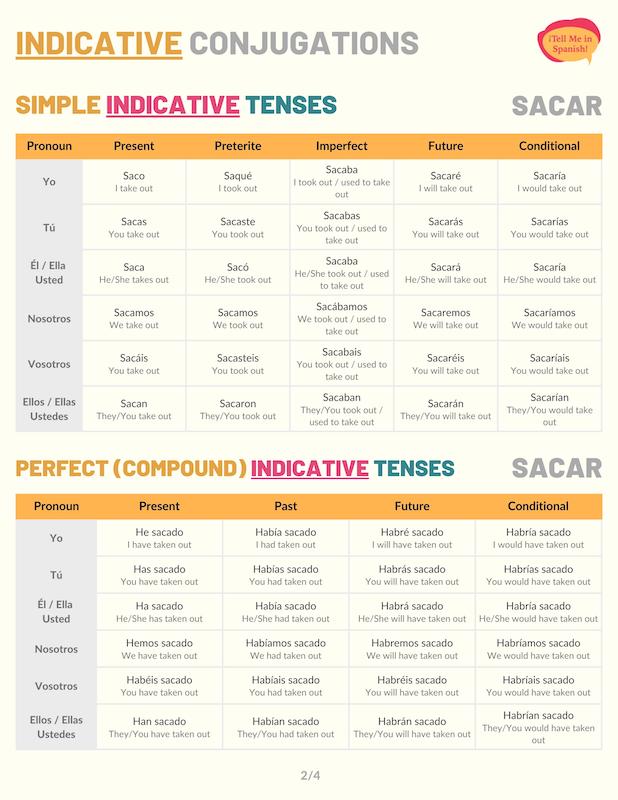In Spanish, the verb sacar has consonant changes to keep pronunciation consistent. Since it can help you understand how -AR verbs with consonant changes work, in this guide, you’ll learn the sacar conjugation charts and patterns. Here is what we’ll cover:
- Sacar Overview
- Indicative Tenses of Sacar Conjugations
- Subjunctive Tenses of Sacar Conjugations
- Imperative (Commands) of Sacar Conjugations
- Uses & Examples
- Download Sacar Conjugation Tables & Uses Cheat sheets
- Sacar Conjugation Practice Quiz
Overview of Sacar
| Verb Characteristic | Property |
|---|---|
| Verb Type | -AR |
| Irregular | No |
| Infinitive | Sacar |
| Gerund (Present Participle) Form | Sacando |
| Past Participle Form | Sacado |
| Synonyms | Extraer, obtener, apartar. |
Stem Changes: E to IE
- Preterite: saqu only for ‘yo’.
- Present subjunctive: saqu for all subject pronouns.
- Affirmative Commands: saqu only for ‘usted’ and ‘ustedes’.
- Negative Commands: saqu for all subject pronouns.
Among other applications, sacar means ‘to take out’, ‘to extract’, or ‘to get’. The conjugations charts below only have one translation to keep the tables as organized and useful as possible. You can learn more about the meanings of ‘sacar’ in the section Uses & Meanings.
Indicative Conjugations of Sacar
Present tense
Sacar present conjugations don’t have spelling changes. We use this verb in the present tense to refer to the things people currently take out. For example: Siempre sacamos la basura en la mañana.
| Person | Conjugation | Translation |
|---|---|---|
| Yo | Saco | I take out |
| Tú | Sacas | You take out |
| Él / Ella Usted | Saca | He/She takes out You (formal) take out |
| Nosotros | Sacamos | We take out |
| Vosotros | Sacáis | You take out |
| Ellos / Ellas Ustedes | Sacan | They take out You (plural) take out |
Preterite tense
Sacar preterite conjugations only have one stem change. To conjugate sacar to its ‘yo’ form, we must use the stem saqu. In the preterite tense, this verb communicates that people took something out. If needed, you can use past time markers to point to a specific time frame.
Here is an example: Yo no saqué mis cosas del carro.
| Person | Conjugation | Translation |
|---|---|---|
| Yo | Saqué | I took out |
| Tú | Sacaste | You took out |
| Él / Ella Usted | Sacó | He/She took out You (formal) took out |
| Nosotros | Sacamos | We took out |
| Vosotros | Sacasteis | You took out |
| Ellos / Ellas Ustedes | Sacaron | They took out You (plural) took out |
Take Note: Spanish verbs that end with –car will have stem changes in the preterite tense. These changes are made to maintain the sound consistent across all conjugations.
Imperfect tense
Sacar imperfect conjugations allow you to refer to things that people used to take out for a long period of time in the past. You may also use these forms when it’s not clear when someone took something out. For instance: Nosotros siempre sacábamos a mi perro a pasear.
| Person | Conjugation | Translation |
|---|---|---|
| Yo | Sacaba | I took out I used to take out |
| Tú | Sacabas | You took out You used to take out |
| Él / Ella Usted | Sacaba | He/She took out He/She used to take out You (formal) took out You (formal) used to take out |
| Nosotros | Sacábamos | We took out We used to take out |
| Vosotros | Sacabais | You took out You used to take out |
| Ellos / Ellas Ustedes | Sacaban | They took out They used to take out You (plural) took out You (plural) used to take out |
Near future
The immediate or near future in Spanish is formed with ir (present tense) + a + infinitive verb (in this case, ‘sacar’). These future forms allow you to convey that a person is going to take something out in the immediate future.
For example: ¿Cuándo vas a sacar la basura de tu cuarto?
| Person | Conjugation | Translation |
|---|---|---|
| Yo | Voy a sacar | I’m going to take out |
| Tú | Vas a sacar | You’re going to take out |
| Él / Ella Usted | Va a sacar | He/She is going to take out You (formal) are going to take out |
| Nosotros | Vamos a sacar | We’re going to take out |
| Vosotros | Vais a sacar | You’re going to take out |
| Ellos / Ellas Ustedes | Van a sacar | They’re going to take out You (plural) are going to take out |
Future simple tense
Sacar future tense conjugations express that someone will take something out at some point in the future. For example: En unas horas sacaremos a los perros a pasear.
| Person | Conjugation | Translation |
|---|---|---|
| Yo | Sacaré | I will take out |
| Tú | Sacarás | You will take out |
| Él / Ella Usted | Sacará | He/She will take out You (formal) will take out |
| Nosotros | Sacaremos | We will take out |
| Vosotros | Sacaréis | You (formal) will take out |
| Ellos / Ellas Ustedes | Sacarán | They will take out You (plural) will take out |
Conditional tense
When used in the conditional tense, ‘sacar’ communicates that people would take something out. This allows you to ask politely or express that things will only be taken out if a condition is met. For instance: Yo sacaría mis cosas, pero no tengo dónde guardarlas.
| Person | Conjugation | Translation |
|---|---|---|
| Yo | Sacaría | I would take out |
| Tú | Sacarías | You would take out |
| Él / Ella Usted | Sacaría | He/She would take out You (formal) would take out |
| Nosotros | Sacaríamos | We would take out |
| Vosotros | Sacaríais | You would take out |
| Ellos / Ellas Ustedes | Sacarían | They would take out You (plural) would take out |
Present perfect tense
To conjugate the Spanish present perfect, use the formula haber in the present tense + sacado (past participle). We use these conjugations to express that someone has or hasn’t taken things out. For example: ¿Todavía no habéis sacado la basura?
| Person | Conjugation | Translation |
|---|---|---|
| Yo | He sacado | I have taken out |
| Tú | Has sacado | You have taken out |
| Él / Ella Usted | Ha sacado | He/She has taken out You (formal) have taken out |
| Nosotros | Hemos sacado | We have taken out |
| Vosotros | Habéis sacado | You have taken out |
| Ellos / Ellas Ustedes | Han sacado | They have taken out You (plural) have taken out |
Past perfect
The Spanish past perfect indicative tense is formed with haber (imperfect form) + past participle form of ‘sacar’. We use this tense to express that someone had taken something out before another past action. Cuando llegué, los niños ya habían sacado la basura.
| Person | Conjugation | Translation |
|---|---|---|
| Yo | Había sacado | I had taken out |
| Tú | Habías sacado | You had taken out |
| Él / Ella Usted | Había sacado | He/She had taken out You (formal) had taken out |
| Nosotros | Habíamos sacado | We had taken out |
| Vosotros | Habíais sacado | You had taken out |
| Ellos / Ellas Ustedes | Habían sacado | They had taken out You (plural) had taken out |
Future perfect
The Spanish future perfect tense of sacar expresses that someone will have taken something out by or before a certain moment in the future. We can also use these forms to say that people might have taken something out. El lunes ya habré sacado toda mi ropa.
| Person | Conjugation | Translation |
|---|---|---|
| Yo | Habré sacado | I will have taken out |
| Tú | Habrás sacado | You will have taken out |
| Él / Ella Usted | Habrá sacado | He/She will have taken out You (formal) will have taken out |
| Nosotros | Habremos sacado | We will have taken out |
| Vosotros | Habréis sacado | You will have taken out |
| Ellos / Ellas Ustedes | Habrán sacado | They will have taken out You (plural) will have taken out |
Conditional perfect
Conjugate sacar to the conditional perfect tense in Spanish to explain that people would have taken something out if a past circumstance had been met. For example: Si no le hubieras dicho, Tobey nunca habría sacado sus cosas.
| Person | Conjugation | Translation |
|---|---|---|
| Yo | Habría sacado | I would have taken out |
| Tú | Habrías sacado | You would have taken out |
| Él / Ella Usted | Habría sacado | He/She would have taken out You (formal) would have taken out |
| Nosotros | Habríamos sacado | We would have taken out |
| Vosotros | Habríais sacado | You would have taken out |
| Ellos / Ellas Ustedes | Habrían sacado | They would have taken out You (plural) would have taken out |
Progressive tenses
The Spanish progressive tenses are formed with estar conjugated + sacando (present participle). We use the progressive conjugations of sacar to express that someone is taking something out at the moment of speaking.
For example: Mis hermanos están sacando unas cajas de la cochera.
| Progressive Tense | Formula | Translation Example |
|---|---|---|
| Present | Estar (present) + sacando | I am taking out |
| Preterite | Estar (preterite) + sacando | You were taking out |
| Imperfect | Estar (imperfect) + sacando | He was taking out |
| Future | Estar (future) + sacando | We will be taking out |
| Conditional | Estar (conditional) + sacando | They would be taking out |
Sacar Subjunctive Conjugations
In Spanish, the subjunctive mood allows you to talk about wishes, requests, suggestions, expectations, doubts, or hypothetical situations. Below are sacar conjugation charts for the most common subjunctive tenses.
Present subjunctive
Since all sacar subjunctive conjugations have an -e ending, we must use the root saqu to keep pronunciation consistent. These present subjunctive conjugations of this verb are used to request someone to take something out.
Here is a sentence example: Diles que saquen sus cosas.
| Person | Conjugation | Translation |
|---|---|---|
| Yo | Saque | I take out |
| Tú | Saques | You take out |
| Él / Ella Usted | Saque | He/She takes out You (formal) take out |
| Nosotros | Saquemos | We take out |
| Vosotros | Saquéis | You take out |
| Ellos / Ellas Ustedes | Saquen | They take out You (plural) take out |
Take Note: In its infinitive form, sacar has a hard ‘c’ sound. As a result, we must keep this sound consistent across all conjugations. To do this, we use the stem saqu. This pattern is applied to all verbs ending in –car.
Present perfect subjunctive
The present perfect subjunctive in Spanish is formed with haber (present subjunctive form) + sacado (past participle). When conjugated to this tense, this verb expresses uncertainty about people taking things out. It can also be used to wish someone has already taken things out.
For example: Espero que ya hayan sacado la basura.
| Person | Conjugation | Translation |
|---|---|---|
| Yo | Haya sacado | I have taken out |
| Tú | Hayas sacado | You have taken out |
| Él / Ella Usted | Haya sacado | He/She has taken out You (formal) have taken out |
| Nosotros | Hayamos sacado | We have taken out |
| Vosotros | Hayáis sacado | You have taken out |
| Ellos / Ellas Ustedes | Hayan sacado | They have taken out You (plural) have taken out |
Imperfect subjunctive
We use the imperfect subjunctive conjugations of ‘sacar’ to refer to past requests, suggestions, wishes you or someone else had about a person taking things out. La señora nos pidió que sacáramos estas cajas de su coche.
The imperfect subjunctive has two conjugation models depending on the type of Spanish you use:
Latin American Spanish version
| Person | Conjugation | Translation |
|---|---|---|
| Yo | Sacara | I took out |
| Tú | Sacaras | You took out |
| Él / Ella Usted | Sacara | He/She took out You (formal) took out |
| Nosotros | Sacáramos | We took out |
| Ellos / Ellas Ustedes | Sacaran | They took out You (plural) took out |
Note: Vosotros is only used in Castilian Spanish. As a result, this pronoun has been excluded from the Latin American conjugation chart.
Castilian Spanish version
| Person | Conjugation | Translation |
|---|---|---|
| Yo | Sacase | I took out |
| Tú | Sacases | You took out |
| Él / Ella Usted | Sacase | He/She took out You (formal) took out |
| Nosotros | Sacásemos | We took out |
| Vosotros | Sacaseis | You took out |
| Ellos / Ellas Ustedes | Sacasen | They took out You (plural) took out |
Past perfect subjunctive
In the past perfect subjunctive, sacar expresses that someone would have taken something out as long as a past circumstance was met. These subjunctive conjugations can also express regret for things you hadn’t taken out.
For example: Si hubiera sacado la basura a tiempo, la habrían recolectado.
| Person | Conjugation | Translation |
|---|---|---|
| Yo | Hubiera sacado | I had taken out |
| Tú | Hubieras sacado | You had taken out |
| Él / Ella Usted | Hubiera sacado | He/She had taken out You (formal) had taken out |
| Nosotros | Hubiéramos sacado | We had taken out |
| Vosotros | Hubierais sacado | You had taken out |
| Ellos / Ellas Ustedes | Hubieran sacado | They had taken out You (plural) had taken out |
Sacar Imperative Conjugations
In Spanish, the imperative or command forms are used to give orders to people.
Affirmative commands
The affirmative commands of ‘sacar’ must use the stem saqu for the pronouns ‘usted’ and ‘ustedes’. Use the affirmative imperative to order people to take things out. For instance: Niños, sacad la ropa de la lavadora.
| Person | Conjugation | Translation |
|---|---|---|
| Tú | Saca | Take out |
| Usted | Saque | Take out |
| Vosotros | Sacad | Take out |
| Ustedes | Saquen | Take out |
Negative commands
On the other hand, you’ll use the negative imperative of ‘sacar’ to order people not to take something out. As shown in the conjugation chart below, these negative commands are formed with the stem saqu. Here is a sentence: ¡No saques esas bolsas!
| Person | Conjugation | Translation |
|---|---|---|
| Tú | No saques | Don’t take out |
| Usted | No saque | Don’t take out |
| Vosotros | No saquéis | Don’t take out |
| Ustedes | No saquen | Don’t take out |
Meanings of Sacar & Examples
Now that you have a complete understanding of how to conjugate sacar, let’s see some of the most common meanings of this verb.
- Talking about extracting or taking something out
El dentista me sacó un diente.
The dentist extracted my tooth.
Saquen a los perros a pasear
Take the dogs out for a walk.
Take Note: The preposition a can be used to introduce the indirect object of the sentence or to convey destination (to where you’ll take something out).
- Expressing that someone achieved a goal
¿Cuánto sacaste en el examen?
What did you get on the test?
Nunca había sacado un ocho.
I had never gotten an eight before.
- Referring to serving (sports)
¿Quién saca?
Who serves?
Ellos sacan muy bien.
They serve very well.
Download Sacar Conjugation Charts & Uses Cheat sheets

Sacar is a stem-changing verb, so it can take some time to familiarize yourself with all of its forms. I’ve created a cheat sheets PDF with all the sacar conjugation charts as well as the meanings and uses you can download for free and review later.
Practice Quiz: Sacar Conjugation

Now that you’ve learned how to conjugate sacar, you can practice your skills of using it in all the different tenses by taking this sacar conjugation practice quiz.



